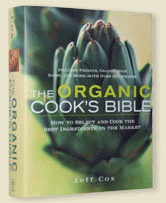Brits Say Americans Ignorant about GMOs
Organic Lifestyle Comments Off on Brits Say Americans Ignorant about GMOs
A British publication called FoodBev Media Ltd., recently spread this headline across the top of its front page: “Majority of US Consumers ‘Lack Understanding’ of GMOs.”
The article begins: “Almost 60 percent of American consumers have ‘a fair or poor understanding’ of GMO foods, despite generally supporting a recently approved bill to introduce mandatory labeling of GMOs in the US.”
I’d like to unpack this article to show you the “man behind the curtain” whose subtle and blatantly egregious lies impugn American intelligence. Let’s start with the next paragraph:
“That is the finding of a new piece of research, which has also shown that a majority of Americans are unaware of the scientific consensus that genetically modified foods are safe to consume. The study was conducted by researchers from the Department of Life Sciences Communication at the University of Wisconsin-Madison and the Annenberg Public Policy Center of the University of Pennsylvania.”
Maybe the majority of Americans are unaware of the scientific consensus because it doesn’t exist. Big food, biotech, and agriculture keep claiming that there’s a consensus, but, as last week’s issue of organicfoodguy showed, it’s bogus. Scientists around the world warn of the dangers of GMOs. Farmers as well as governmental agencies through Europe and Russia, and now Africa, South America, Central America, and Asia are fighting back against Monsanto’s patented GMO seeds. But back to the article:
“The vast majority of Americans-–88 percent-–said they support the mandatory labeling of foods containing GMOs, and 91 percent agreed that people have the right to know when they buy or eat products that contain genetically modified ingredients.”
That is true, but if the majority of American consumers lack understanding of GMOs, how come they overwhelmingly want to know which foods contain them? In order to select them to take home for the kids? To make sure the family gets its daily dose of GMOs? No. They want GMO food labeled so they can avoid it. And let’s go back and look at this article’s lead paragraph again. It says, “60 percent of American consumers have ‘a fair or poor understanding’ of GMO foods, despite generally supporting a recently approved bill to introduce mandatory labelling of GMOs in the US.” That bill sits on President Obama’s desk as I write this. Big food, biotech, and chemical ag have sold that bill as pro-labeling legislation, but it’s anything but. It is known as the Monsanto Dream Act because it gives Monsanto everything it dreams about, and it’s also called the DARK Act because DARK stands for “Deny Americans the Right to Know.” It does not require mandatory labeling. That’s a lie. It’s entirely voluntary. And instead of requiring that the food be labeled, it allows food manufacturers to hide the presence of GMOs behind QR codes, so that to find out if a food contains GMOs, you have to scan the code with your smartphone, then paw through a website to see if it contains GMOs—and again, it’s up to the manufacturer to decide whether it wants to put that info on the website. This scheme does everything except shout at consumers, “Shut the F*** Up!” But back to the article:
“Fewer than one in five respondents out of a total of more than 1,000 were aware of research that said there was ‘no substantiated evidence of a difference in risks to human health between currently commercialized genetically engineered crops and conventionally bred crops.’”
There is such research, but it’s a pack of lies produced by scientists paid by Monsanto and other like-minded corporations to reach that conclusion. Look, if I take a cat and insert fish genes into its DNA, it is not substantially equivalent to a plain cat. And there is no research, which I pointed out in last week’s blog, that has assessed the risk of ingesting GMOs on human health, because to do such research would violate international treaty against experimenting on human beings. There have been a lot of animal studies, however, and they are so horrifying that the World Health Organization has warned the world that Monsanto’s Roundup herbicide that is used in conjunction with its GMO seeds, is very likely cancer-causing. And again, see last week’s blog that compared pigs fed GMO feed with pigs fed organic food, and note the inflamed and swollen internal organs researchers found in the GMO pigs. So the one-in-five respondents who said they were aware of research showing no risk from GMO foods are just telling the questioners what they think the questioners want to hear. Such research has never been done.
“Nearly half—48 percent–went so far as to say they disagreed that genetically modified foods posed no risk to human health. Only 39 percent of people agreed that GMO crops were safe to eat, while 27 percent disagreed.”
Wait. What? So 48 percent “went so far” as to disagree with the claim that GMOs are safe to eat; 39 percent agreed they were safe to eat; 27 percent disagreed with the claim that GMO are safe to eat. Why those numbers total 114 percent. Why, those ignorant Americans can’t even add up to 100 percent, and which is it—48 or 27 percent who disagreed with the claim that GMOs are safe?
“The labeling bill, approved by Congress earlier this month, calls for the use of on-pack text, a symbol designed by the US Department of Agriculture, or a digital QR code to designate foods containing GMOs.”
Again, this article doesn’t mention that these options are all voluntary. Food manufacturers don’t have to put any information of the wrapper or on a website to signal the inclusion of GMOs. Unless they want to. But as a Monsanto exec once said, “Putting a GMO label on a food would be like putting a skull and crossbones on it.” How many food manufacturers are going to say, “Step right up and getcha GMOs?” But back to the article:
“William Hallman, a visiting scholar at the Annenberg Public Policy Center and professor of human ecology at Rutgers University, said that the bill could help consumers to improve their understanding of genetically modified foods. ‘One potential advantage of using a QR code is that consumers could be linked to much more information about genetically modified ingredients, and how they are produced and regulated, than could ever be printed on a product label,’ he said.”
Really, Professor Hallman? Those consumers fortunate enough to have a smartphone, and with enough time on their hands to scan the QR codes of every item in their shopping cart, will then spend time boning up on industry propaganda about how wonderful and safe GMOs are? Do you really believe that?
The only boning going on around here is the one given to the American public by Big Food, Big Biotech, Big Chem, and Big Ag.
###












